Comprehensive Report: Sustainable Tourism's Purpose in Global Context
VerifiedAdded on 2023/01/04
|9
|2658
|34
Report
AI Summary
This report provides a comprehensive overview of sustainable tourism, exploring its purpose and significance in both developed and emerging nations. It defines sustainable tourism as a practice that considers environmental, social, economic, and human resources to ensure continuous growth for future generations. The report highlights the contributions of the tourism industry to GDP and employment, emphasizing the importance of government policies and public awareness campaigns. It delves into the purpose of sustainable tourism, including economic viability, local prosperity, social equity, and visitor fulfillment, as outlined by the UNWTO. The report further discusses the benefits of sustainable tourism, such as economic advantages, environmental preservation, and community development, while also examining its impacts in both developed nations (e.g., England) and emerging countries (e.g., Philippines). It concludes by emphasizing the need for sustainable tourism practices to balance economic growth with environmental protection and community well-being, promoting responsible tourism that minimizes negative impacts and maximizes positive contributions. The report underscores the role of sustainable tourism in fostering intercultural understanding, preserving biodiversity, and improving the overall quality of life for local communities.
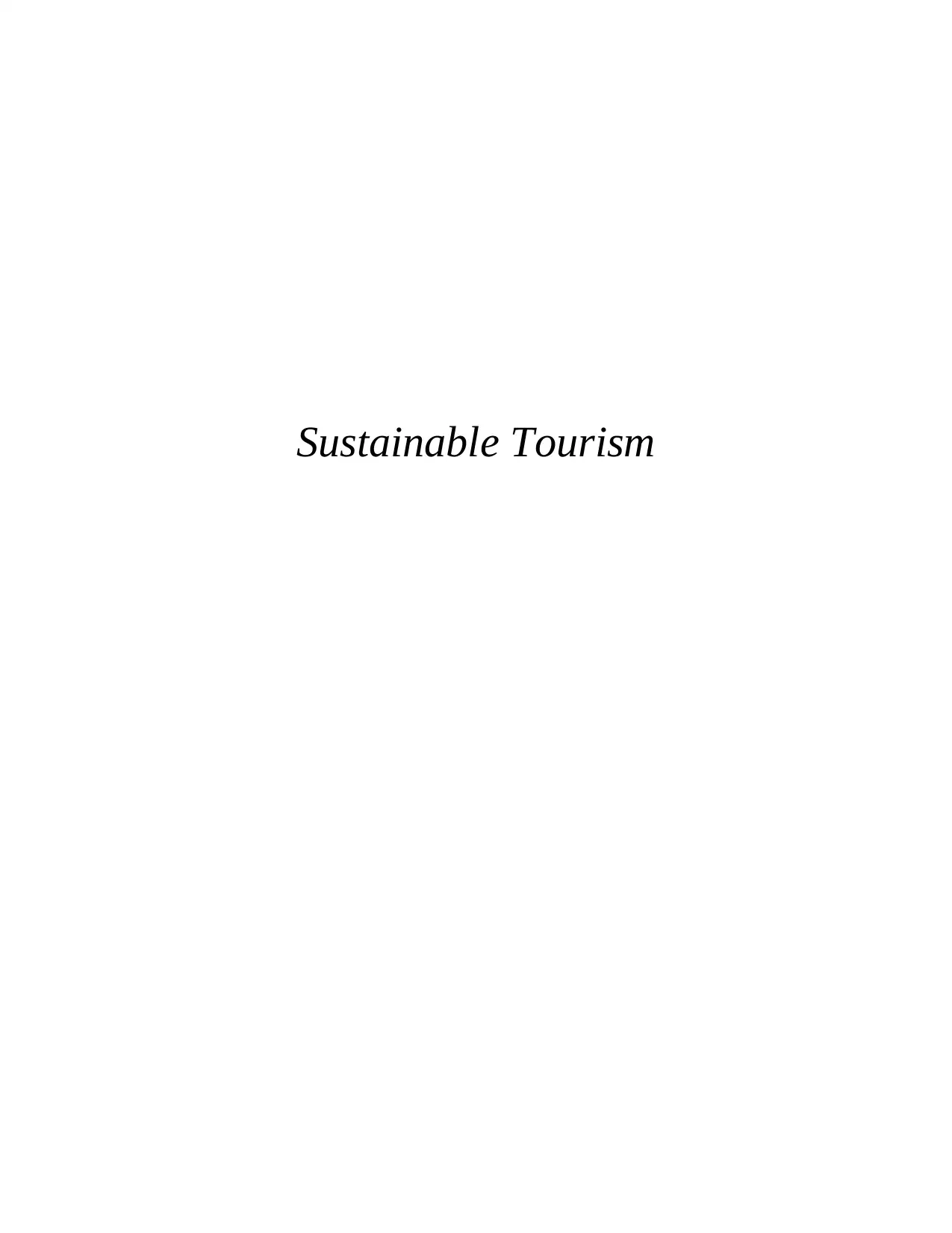
Sustainable Tourism
Paraphrase This Document
Need a fresh take? Get an instant paraphrase of this document with our AI Paraphraser
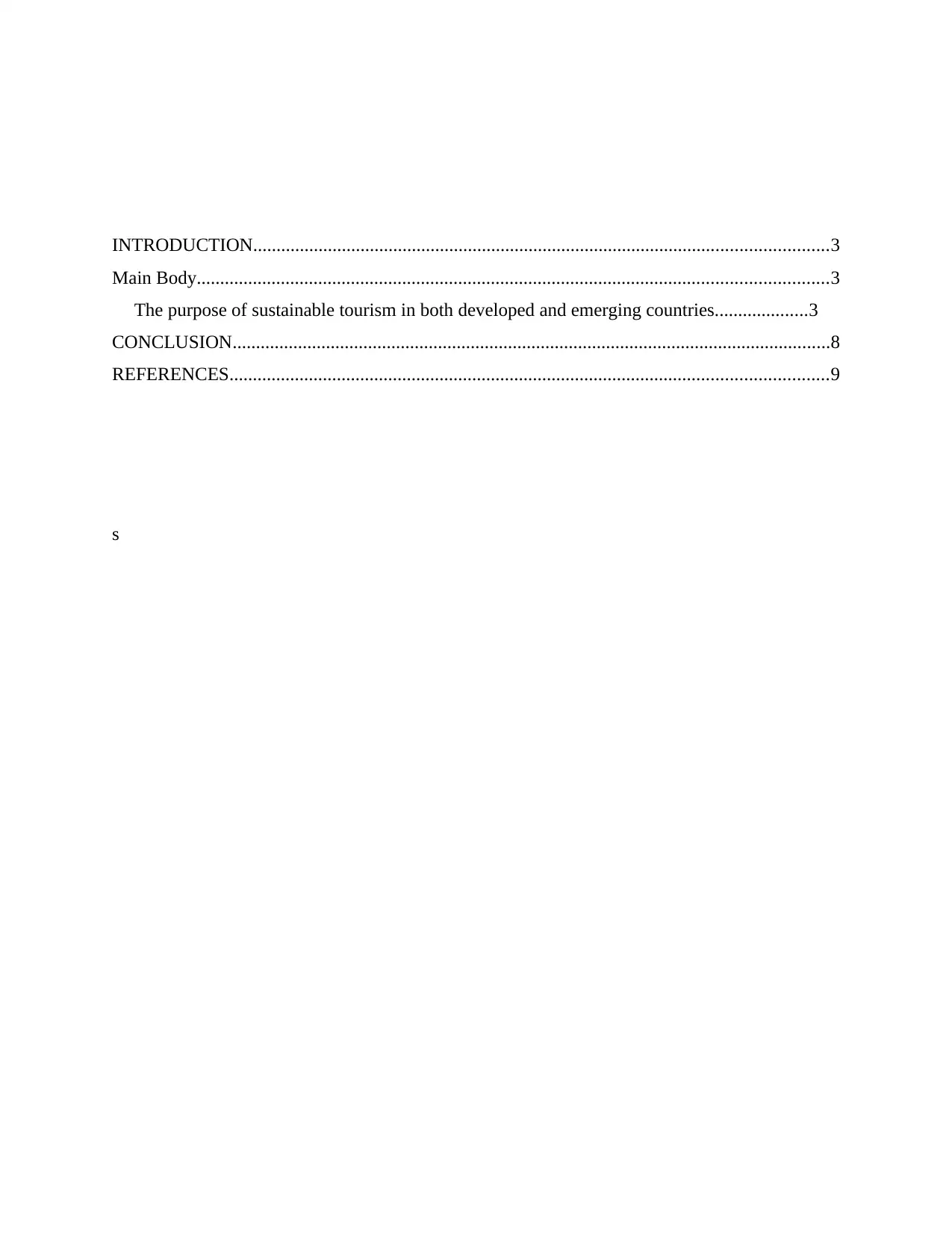
INTRODUCTION...........................................................................................................................3
Main Body.......................................................................................................................................3
The purpose of sustainable tourism in both developed and emerging countries....................3
CONCLUSION................................................................................................................................8
REFERENCES................................................................................................................................9
s
Main Body.......................................................................................................................................3
The purpose of sustainable tourism in both developed and emerging countries....................3
CONCLUSION................................................................................................................................8
REFERENCES................................................................................................................................9
s
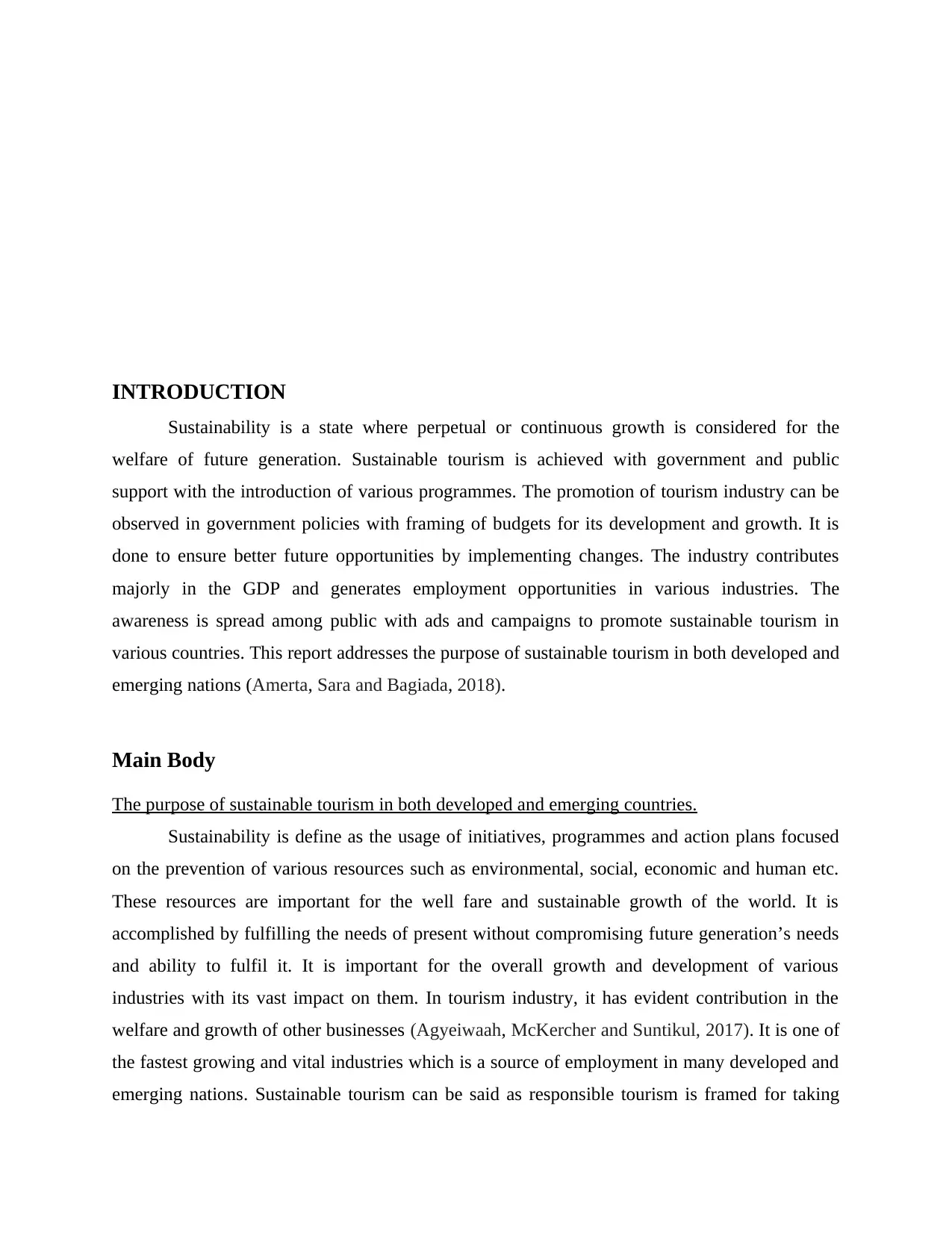
INTRODUCTION
Sustainability is a state where perpetual or continuous growth is considered for the
welfare of future generation. Sustainable tourism is achieved with government and public
support with the introduction of various programmes. The promotion of tourism industry can be
observed in government policies with framing of budgets for its development and growth. It is
done to ensure better future opportunities by implementing changes. The industry contributes
majorly in the GDP and generates employment opportunities in various industries. The
awareness is spread among public with ads and campaigns to promote sustainable tourism in
various countries. This report addresses the purpose of sustainable tourism in both developed and
emerging nations (Amerta, Sara and Bagiada, 2018).
Main Body
The purpose of sustainable tourism in both developed and emerging countries.
Sustainability is define as the usage of initiatives, programmes and action plans focused
on the prevention of various resources such as environmental, social, economic and human etc.
These resources are important for the well fare and sustainable growth of the world. It is
accomplished by fulfilling the needs of present without compromising future generation’s needs
and ability to fulfil it. It is important for the overall growth and development of various
industries with its vast impact on them. In tourism industry, it has evident contribution in the
welfare and growth of other businesses (Agyeiwaah, McKercher and Suntikul, 2017). It is one of
the fastest growing and vital industries which is a source of employment in many developed and
emerging nations. Sustainable tourism can be said as responsible tourism is framed for taking
Sustainability is a state where perpetual or continuous growth is considered for the
welfare of future generation. Sustainable tourism is achieved with government and public
support with the introduction of various programmes. The promotion of tourism industry can be
observed in government policies with framing of budgets for its development and growth. It is
done to ensure better future opportunities by implementing changes. The industry contributes
majorly in the GDP and generates employment opportunities in various industries. The
awareness is spread among public with ads and campaigns to promote sustainable tourism in
various countries. This report addresses the purpose of sustainable tourism in both developed and
emerging nations (Amerta, Sara and Bagiada, 2018).
Main Body
The purpose of sustainable tourism in both developed and emerging countries.
Sustainability is define as the usage of initiatives, programmes and action plans focused
on the prevention of various resources such as environmental, social, economic and human etc.
These resources are important for the well fare and sustainable growth of the world. It is
accomplished by fulfilling the needs of present without compromising future generation’s needs
and ability to fulfil it. It is important for the overall growth and development of various
industries with its vast impact on them. In tourism industry, it has evident contribution in the
welfare and growth of other businesses (Agyeiwaah, McKercher and Suntikul, 2017). It is one of
the fastest growing and vital industries which is a source of employment in many developed and
emerging nations. Sustainable tourism can be said as responsible tourism is framed for taking
⊘ This is a preview!⊘
Do you want full access?
Subscribe today to unlock all pages.

Trusted by 1+ million students worldwide
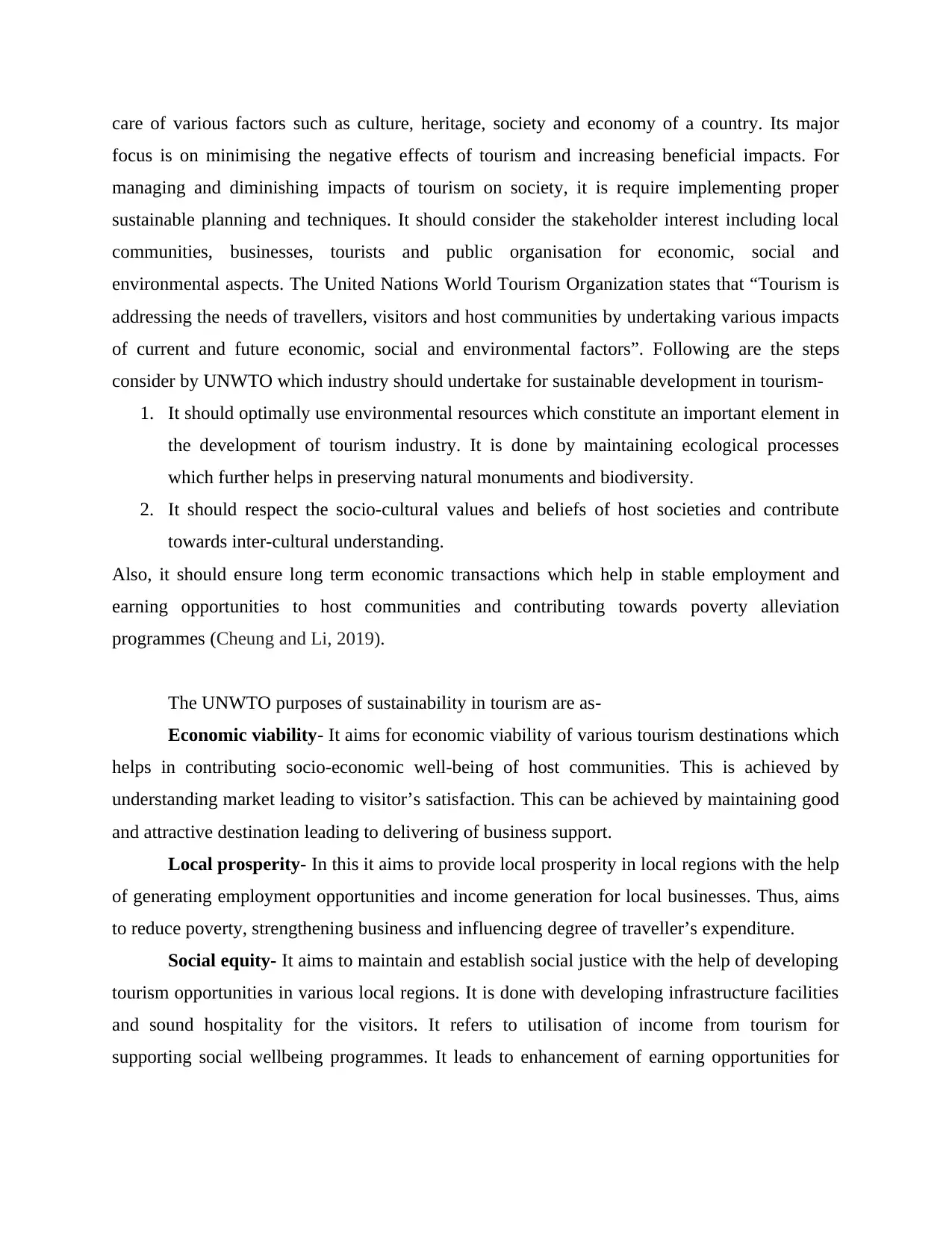
care of various factors such as culture, heritage, society and economy of a country. Its major
focus is on minimising the negative effects of tourism and increasing beneficial impacts. For
managing and diminishing impacts of tourism on society, it is require implementing proper
sustainable planning and techniques. It should consider the stakeholder interest including local
communities, businesses, tourists and public organisation for economic, social and
environmental aspects. The United Nations World Tourism Organization states that “Tourism is
addressing the needs of travellers, visitors and host communities by undertaking various impacts
of current and future economic, social and environmental factors”. Following are the steps
consider by UNWTO which industry should undertake for sustainable development in tourism-
1. It should optimally use environmental resources which constitute an important element in
the development of tourism industry. It is done by maintaining ecological processes
which further helps in preserving natural monuments and biodiversity.
2. It should respect the socio-cultural values and beliefs of host societies and contribute
towards inter-cultural understanding.
Also, it should ensure long term economic transactions which help in stable employment and
earning opportunities to host communities and contributing towards poverty alleviation
programmes (Cheung and Li, 2019).
The UNWTO purposes of sustainability in tourism are as-
Economic viability- It aims for economic viability of various tourism destinations which
helps in contributing socio-economic well-being of host communities. This is achieved by
understanding market leading to visitor’s satisfaction. This can be achieved by maintaining good
and attractive destination leading to delivering of business support.
Local prosperity- In this it aims to provide local prosperity in local regions with the help
of generating employment opportunities and income generation for local businesses. Thus, aims
to reduce poverty, strengthening business and influencing degree of traveller’s expenditure.
Social equity- It aims to maintain and establish social justice with the help of developing
tourism opportunities in various local regions. It is done with developing infrastructure facilities
and sound hospitality for the visitors. It refers to utilisation of income from tourism for
supporting social wellbeing programmes. It leads to enhancement of earning opportunities for
focus is on minimising the negative effects of tourism and increasing beneficial impacts. For
managing and diminishing impacts of tourism on society, it is require implementing proper
sustainable planning and techniques. It should consider the stakeholder interest including local
communities, businesses, tourists and public organisation for economic, social and
environmental aspects. The United Nations World Tourism Organization states that “Tourism is
addressing the needs of travellers, visitors and host communities by undertaking various impacts
of current and future economic, social and environmental factors”. Following are the steps
consider by UNWTO which industry should undertake for sustainable development in tourism-
1. It should optimally use environmental resources which constitute an important element in
the development of tourism industry. It is done by maintaining ecological processes
which further helps in preserving natural monuments and biodiversity.
2. It should respect the socio-cultural values and beliefs of host societies and contribute
towards inter-cultural understanding.
Also, it should ensure long term economic transactions which help in stable employment and
earning opportunities to host communities and contributing towards poverty alleviation
programmes (Cheung and Li, 2019).
The UNWTO purposes of sustainability in tourism are as-
Economic viability- It aims for economic viability of various tourism destinations which
helps in contributing socio-economic well-being of host communities. This is achieved by
understanding market leading to visitor’s satisfaction. This can be achieved by maintaining good
and attractive destination leading to delivering of business support.
Local prosperity- In this it aims to provide local prosperity in local regions with the help
of generating employment opportunities and income generation for local businesses. Thus, aims
to reduce poverty, strengthening business and influencing degree of traveller’s expenditure.
Social equity- It aims to maintain and establish social justice with the help of developing
tourism opportunities in various local regions. It is done with developing infrastructure facilities
and sound hospitality for the visitors. It refers to utilisation of income from tourism for
supporting social wellbeing programmes. It leads to enhancement of earning opportunities for
Paraphrase This Document
Need a fresh take? Get an instant paraphrase of this document with our AI Paraphraser
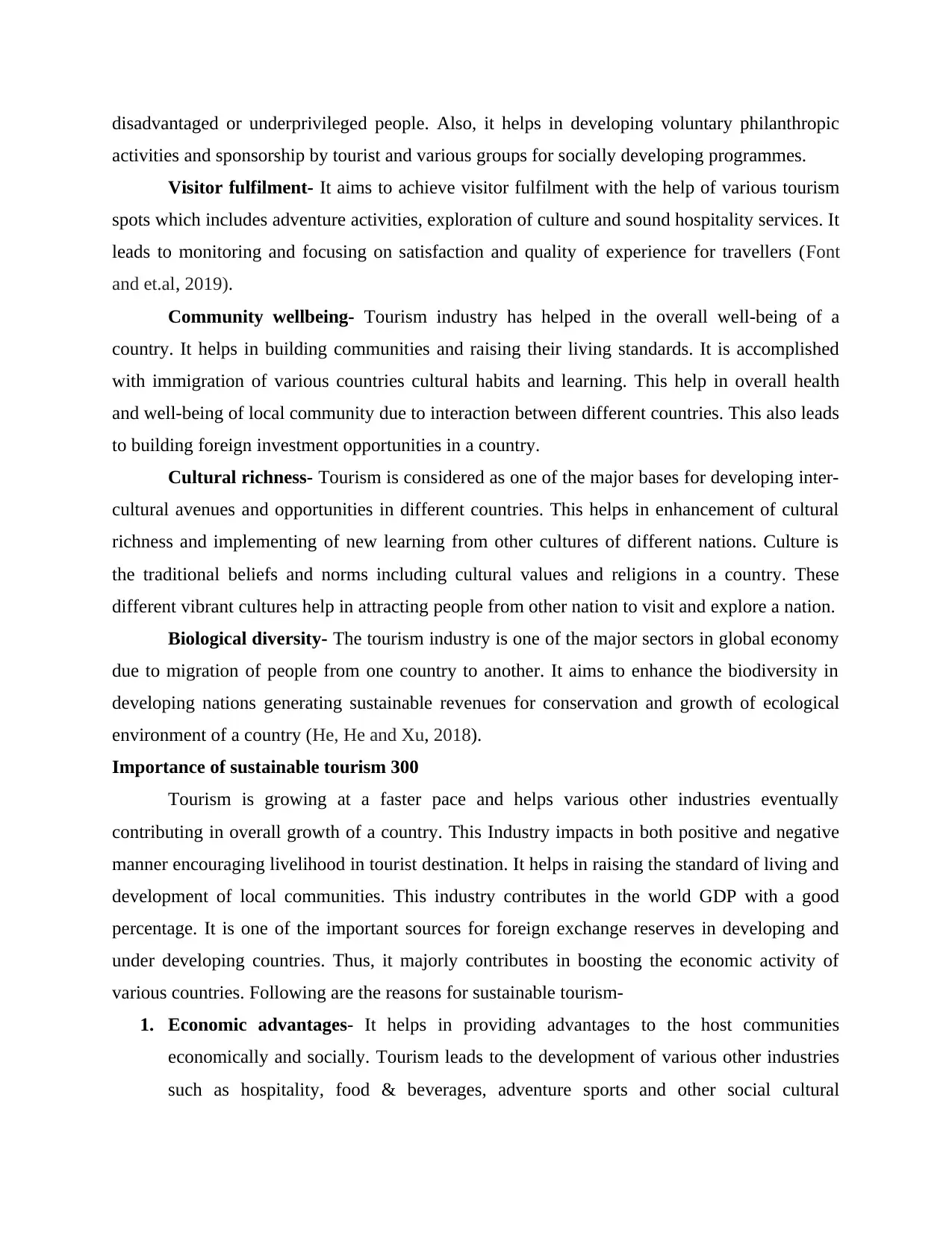
disadvantaged or underprivileged people. Also, it helps in developing voluntary philanthropic
activities and sponsorship by tourist and various groups for socially developing programmes.
Visitor fulfilment- It aims to achieve visitor fulfilment with the help of various tourism
spots which includes adventure activities, exploration of culture and sound hospitality services. It
leads to monitoring and focusing on satisfaction and quality of experience for travellers (Font
and et.al, 2019).
Community wellbeing- Tourism industry has helped in the overall well-being of a
country. It helps in building communities and raising their living standards. It is accomplished
with immigration of various countries cultural habits and learning. This help in overall health
and well-being of local community due to interaction between different countries. This also leads
to building foreign investment opportunities in a country.
Cultural richness- Tourism is considered as one of the major bases for developing inter-
cultural avenues and opportunities in different countries. This helps in enhancement of cultural
richness and implementing of new learning from other cultures of different nations. Culture is
the traditional beliefs and norms including cultural values and religions in a country. These
different vibrant cultures help in attracting people from other nation to visit and explore a nation.
Biological diversity- The tourism industry is one of the major sectors in global economy
due to migration of people from one country to another. It aims to enhance the biodiversity in
developing nations generating sustainable revenues for conservation and growth of ecological
environment of a country (He, He and Xu, 2018).
Importance of sustainable tourism 300
Tourism is growing at a faster pace and helps various other industries eventually
contributing in overall growth of a country. This Industry impacts in both positive and negative
manner encouraging livelihood in tourist destination. It helps in raising the standard of living and
development of local communities. This industry contributes in the world GDP with a good
percentage. It is one of the important sources for foreign exchange reserves in developing and
under developing countries. Thus, it majorly contributes in boosting the economic activity of
various countries. Following are the reasons for sustainable tourism-
1. Economic advantages- It helps in providing advantages to the host communities
economically and socially. Tourism leads to the development of various other industries
such as hospitality, food & beverages, adventure sports and other social cultural
activities and sponsorship by tourist and various groups for socially developing programmes.
Visitor fulfilment- It aims to achieve visitor fulfilment with the help of various tourism
spots which includes adventure activities, exploration of culture and sound hospitality services. It
leads to monitoring and focusing on satisfaction and quality of experience for travellers (Font
and et.al, 2019).
Community wellbeing- Tourism industry has helped in the overall well-being of a
country. It helps in building communities and raising their living standards. It is accomplished
with immigration of various countries cultural habits and learning. This help in overall health
and well-being of local community due to interaction between different countries. This also leads
to building foreign investment opportunities in a country.
Cultural richness- Tourism is considered as one of the major bases for developing inter-
cultural avenues and opportunities in different countries. This helps in enhancement of cultural
richness and implementing of new learning from other cultures of different nations. Culture is
the traditional beliefs and norms including cultural values and religions in a country. These
different vibrant cultures help in attracting people from other nation to visit and explore a nation.
Biological diversity- The tourism industry is one of the major sectors in global economy
due to migration of people from one country to another. It aims to enhance the biodiversity in
developing nations generating sustainable revenues for conservation and growth of ecological
environment of a country (He, He and Xu, 2018).
Importance of sustainable tourism 300
Tourism is growing at a faster pace and helps various other industries eventually
contributing in overall growth of a country. This Industry impacts in both positive and negative
manner encouraging livelihood in tourist destination. It helps in raising the standard of living and
development of local communities. This industry contributes in the world GDP with a good
percentage. It is one of the important sources for foreign exchange reserves in developing and
under developing countries. Thus, it majorly contributes in boosting the economic activity of
various countries. Following are the reasons for sustainable tourism-
1. Economic advantages- It helps in providing advantages to the host communities
economically and socially. Tourism leads to the development of various other industries
such as hospitality, food & beverages, adventure sports and other social cultural
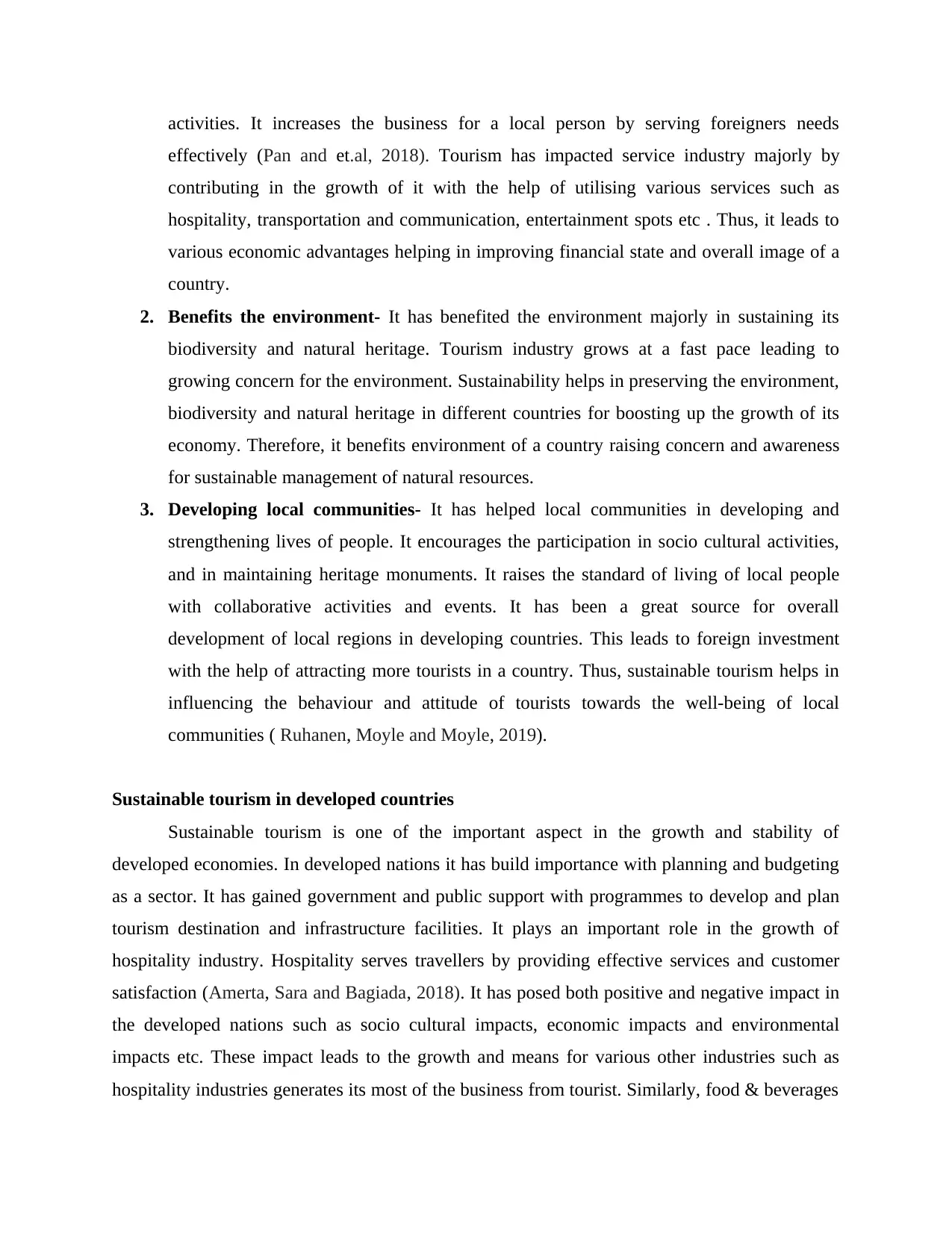
activities. It increases the business for a local person by serving foreigners needs
effectively (Pan and et.al, 2018). Tourism has impacted service industry majorly by
contributing in the growth of it with the help of utilising various services such as
hospitality, transportation and communication, entertainment spots etc . Thus, it leads to
various economic advantages helping in improving financial state and overall image of a
country.
2. Benefits the environment- It has benefited the environment majorly in sustaining its
biodiversity and natural heritage. Tourism industry grows at a fast pace leading to
growing concern for the environment. Sustainability helps in preserving the environment,
biodiversity and natural heritage in different countries for boosting up the growth of its
economy. Therefore, it benefits environment of a country raising concern and awareness
for sustainable management of natural resources.
3. Developing local communities- It has helped local communities in developing and
strengthening lives of people. It encourages the participation in socio cultural activities,
and in maintaining heritage monuments. It raises the standard of living of local people
with collaborative activities and events. It has been a great source for overall
development of local regions in developing countries. This leads to foreign investment
with the help of attracting more tourists in a country. Thus, sustainable tourism helps in
influencing the behaviour and attitude of tourists towards the well-being of local
communities ( Ruhanen, Moyle and Moyle, 2019).
Sustainable tourism in developed countries
Sustainable tourism is one of the important aspect in the growth and stability of
developed economies. In developed nations it has build importance with planning and budgeting
as a sector. It has gained government and public support with programmes to develop and plan
tourism destination and infrastructure facilities. It plays an important role in the growth of
hospitality industry. Hospitality serves travellers by providing effective services and customer
satisfaction (Amerta, Sara and Bagiada, 2018). It has posed both positive and negative impact in
the developed nations such as socio cultural impacts, economic impacts and environmental
impacts etc. These impact leads to the growth and means for various other industries such as
hospitality industries generates its most of the business from tourist. Similarly, food & beverages
effectively (Pan and et.al, 2018). Tourism has impacted service industry majorly by
contributing in the growth of it with the help of utilising various services such as
hospitality, transportation and communication, entertainment spots etc . Thus, it leads to
various economic advantages helping in improving financial state and overall image of a
country.
2. Benefits the environment- It has benefited the environment majorly in sustaining its
biodiversity and natural heritage. Tourism industry grows at a fast pace leading to
growing concern for the environment. Sustainability helps in preserving the environment,
biodiversity and natural heritage in different countries for boosting up the growth of its
economy. Therefore, it benefits environment of a country raising concern and awareness
for sustainable management of natural resources.
3. Developing local communities- It has helped local communities in developing and
strengthening lives of people. It encourages the participation in socio cultural activities,
and in maintaining heritage monuments. It raises the standard of living of local people
with collaborative activities and events. It has been a great source for overall
development of local regions in developing countries. This leads to foreign investment
with the help of attracting more tourists in a country. Thus, sustainable tourism helps in
influencing the behaviour and attitude of tourists towards the well-being of local
communities ( Ruhanen, Moyle and Moyle, 2019).
Sustainable tourism in developed countries
Sustainable tourism is one of the important aspect in the growth and stability of
developed economies. In developed nations it has build importance with planning and budgeting
as a sector. It has gained government and public support with programmes to develop and plan
tourism destination and infrastructure facilities. It plays an important role in the growth of
hospitality industry. Hospitality serves travellers by providing effective services and customer
satisfaction (Amerta, Sara and Bagiada, 2018). It has posed both positive and negative impact in
the developed nations such as socio cultural impacts, economic impacts and environmental
impacts etc. These impact leads to the growth and means for various other industries such as
hospitality industries generates its most of the business from tourist. Similarly, food & beverages
⊘ This is a preview!⊘
Do you want full access?
Subscribe today to unlock all pages.

Trusted by 1+ million students worldwide
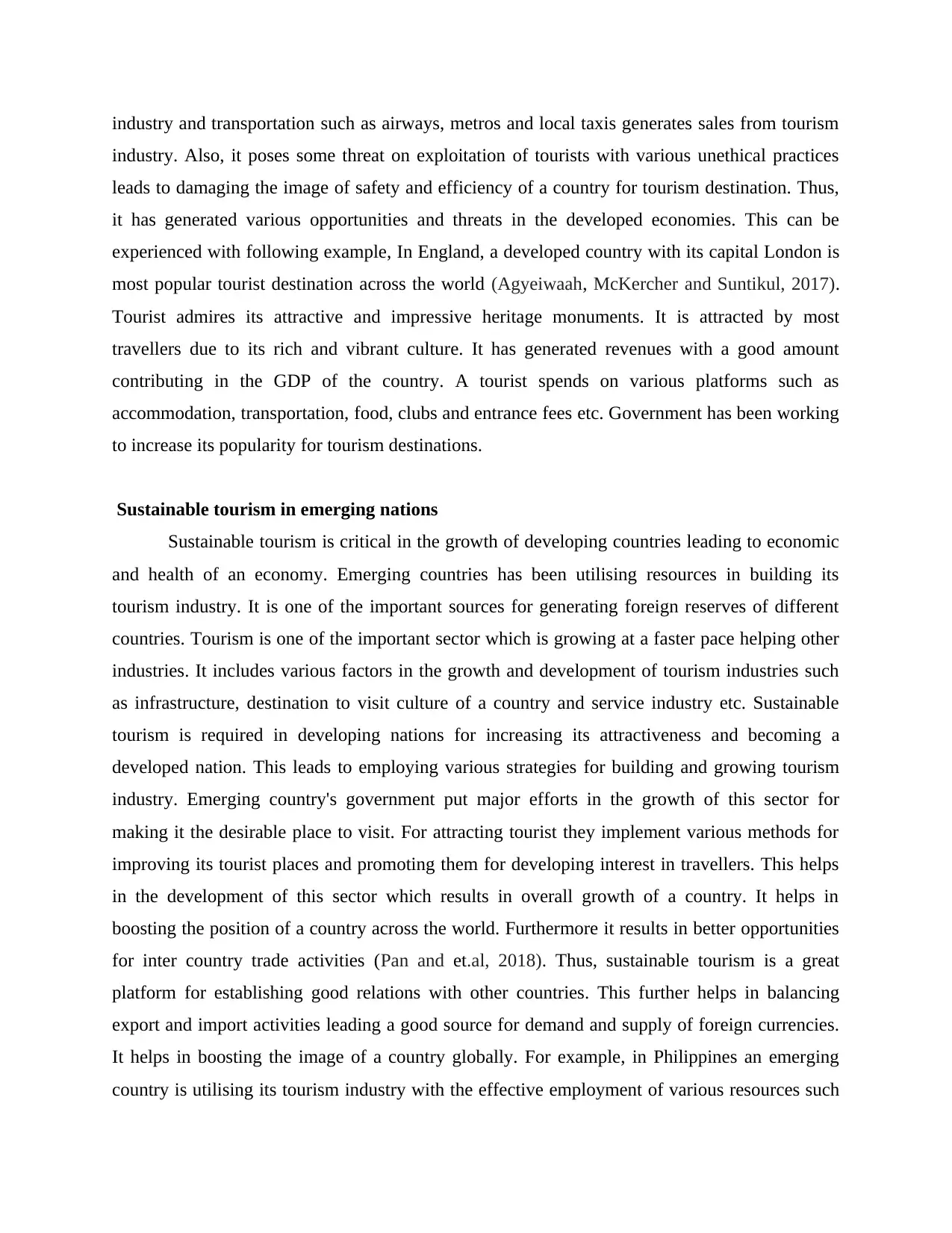
industry and transportation such as airways, metros and local taxis generates sales from tourism
industry. Also, it poses some threat on exploitation of tourists with various unethical practices
leads to damaging the image of safety and efficiency of a country for tourism destination. Thus,
it has generated various opportunities and threats in the developed economies. This can be
experienced with following example, In England, a developed country with its capital London is
most popular tourist destination across the world (Agyeiwaah, McKercher and Suntikul, 2017).
Tourist admires its attractive and impressive heritage monuments. It is attracted by most
travellers due to its rich and vibrant culture. It has generated revenues with a good amount
contributing in the GDP of the country. A tourist spends on various platforms such as
accommodation, transportation, food, clubs and entrance fees etc. Government has been working
to increase its popularity for tourism destinations.
Sustainable tourism in emerging nations
Sustainable tourism is critical in the growth of developing countries leading to economic
and health of an economy. Emerging countries has been utilising resources in building its
tourism industry. It is one of the important sources for generating foreign reserves of different
countries. Tourism is one of the important sector which is growing at a faster pace helping other
industries. It includes various factors in the growth and development of tourism industries such
as infrastructure, destination to visit culture of a country and service industry etc. Sustainable
tourism is required in developing nations for increasing its attractiveness and becoming a
developed nation. This leads to employing various strategies for building and growing tourism
industry. Emerging country's government put major efforts in the growth of this sector for
making it the desirable place to visit. For attracting tourist they implement various methods for
improving its tourist places and promoting them for developing interest in travellers. This helps
in the development of this sector which results in overall growth of a country. It helps in
boosting the position of a country across the world. Furthermore it results in better opportunities
for inter country trade activities (Pan and et.al, 2018). Thus, sustainable tourism is a great
platform for establishing good relations with other countries. This further helps in balancing
export and import activities leading a good source for demand and supply of foreign currencies.
It helps in boosting the image of a country globally. For example, in Philippines an emerging
country is utilising its tourism industry with the effective employment of various resources such
industry. Also, it poses some threat on exploitation of tourists with various unethical practices
leads to damaging the image of safety and efficiency of a country for tourism destination. Thus,
it has generated various opportunities and threats in the developed economies. This can be
experienced with following example, In England, a developed country with its capital London is
most popular tourist destination across the world (Agyeiwaah, McKercher and Suntikul, 2017).
Tourist admires its attractive and impressive heritage monuments. It is attracted by most
travellers due to its rich and vibrant culture. It has generated revenues with a good amount
contributing in the GDP of the country. A tourist spends on various platforms such as
accommodation, transportation, food, clubs and entrance fees etc. Government has been working
to increase its popularity for tourism destinations.
Sustainable tourism in emerging nations
Sustainable tourism is critical in the growth of developing countries leading to economic
and health of an economy. Emerging countries has been utilising resources in building its
tourism industry. It is one of the important sources for generating foreign reserves of different
countries. Tourism is one of the important sector which is growing at a faster pace helping other
industries. It includes various factors in the growth and development of tourism industries such
as infrastructure, destination to visit culture of a country and service industry etc. Sustainable
tourism is required in developing nations for increasing its attractiveness and becoming a
developed nation. This leads to employing various strategies for building and growing tourism
industry. Emerging country's government put major efforts in the growth of this sector for
making it the desirable place to visit. For attracting tourist they implement various methods for
improving its tourist places and promoting them for developing interest in travellers. This helps
in the development of this sector which results in overall growth of a country. It helps in
boosting the position of a country across the world. Furthermore it results in better opportunities
for inter country trade activities (Pan and et.al, 2018). Thus, sustainable tourism is a great
platform for establishing good relations with other countries. This further helps in balancing
export and import activities leading a good source for demand and supply of foreign currencies.
It helps in boosting the image of a country globally. For example, in Philippines an emerging
country is utilising its tourism industry with the effective employment of various resources such
Paraphrase This Document
Need a fresh take? Get an instant paraphrase of this document with our AI Paraphraser
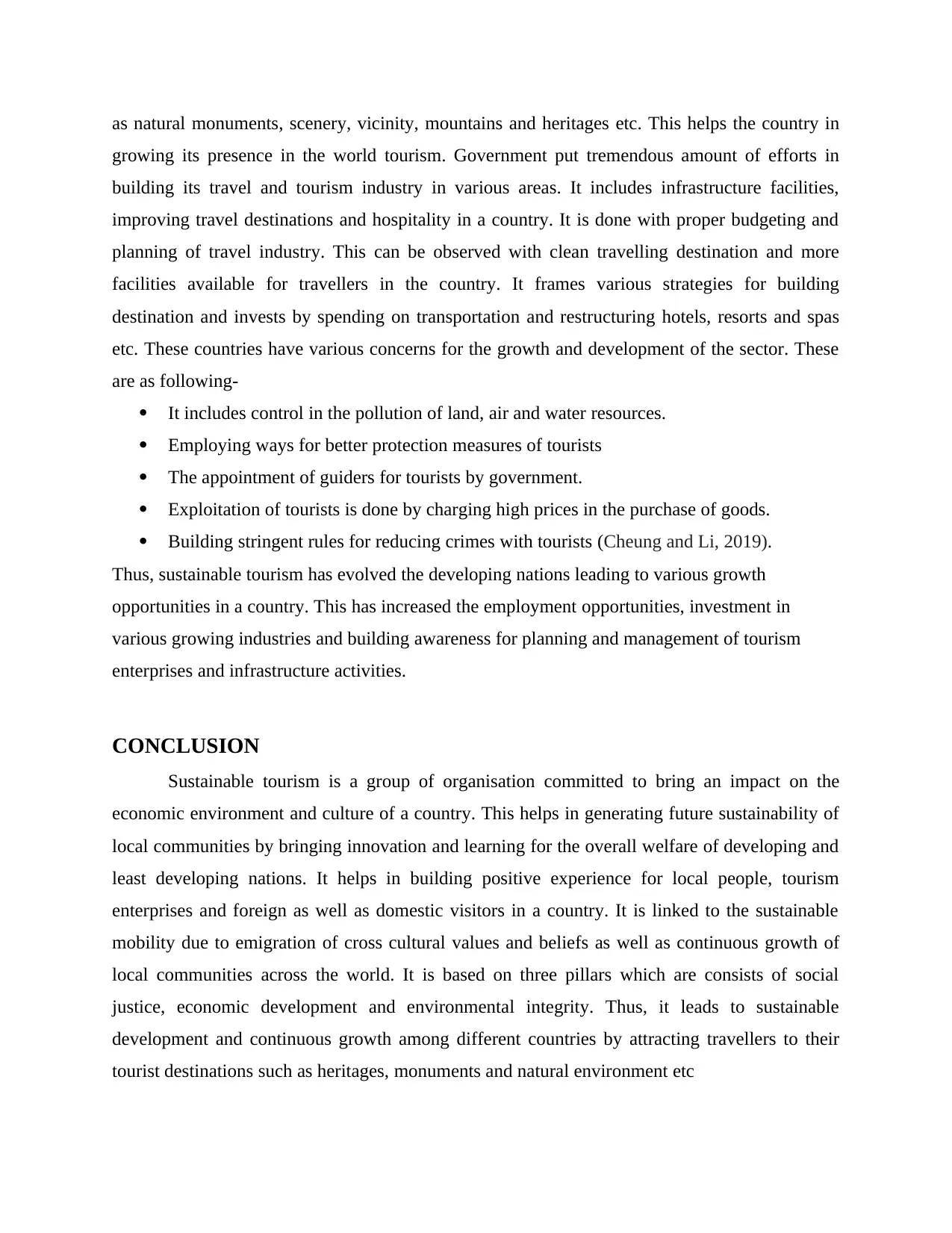
as natural monuments, scenery, vicinity, mountains and heritages etc. This helps the country in
growing its presence in the world tourism. Government put tremendous amount of efforts in
building its travel and tourism industry in various areas. It includes infrastructure facilities,
improving travel destinations and hospitality in a country. It is done with proper budgeting and
planning of travel industry. This can be observed with clean travelling destination and more
facilities available for travellers in the country. It frames various strategies for building
destination and invests by spending on transportation and restructuring hotels, resorts and spas
etc. These countries have various concerns for the growth and development of the sector. These
are as following-
It includes control in the pollution of land, air and water resources.
Employing ways for better protection measures of tourists
The appointment of guiders for tourists by government.
Exploitation of tourists is done by charging high prices in the purchase of goods.
Building stringent rules for reducing crimes with tourists (Cheung and Li, 2019).
Thus, sustainable tourism has evolved the developing nations leading to various growth
opportunities in a country. This has increased the employment opportunities, investment in
various growing industries and building awareness for planning and management of tourism
enterprises and infrastructure activities.
CONCLUSION
Sustainable tourism is a group of organisation committed to bring an impact on the
economic environment and culture of a country. This helps in generating future sustainability of
local communities by bringing innovation and learning for the overall welfare of developing and
least developing nations. It helps in building positive experience for local people, tourism
enterprises and foreign as well as domestic visitors in a country. It is linked to the sustainable
mobility due to emigration of cross cultural values and beliefs as well as continuous growth of
local communities across the world. It is based on three pillars which are consists of social
justice, economic development and environmental integrity. Thus, it leads to sustainable
development and continuous growth among different countries by attracting travellers to their
tourist destinations such as heritages, monuments and natural environment etc
growing its presence in the world tourism. Government put tremendous amount of efforts in
building its travel and tourism industry in various areas. It includes infrastructure facilities,
improving travel destinations and hospitality in a country. It is done with proper budgeting and
planning of travel industry. This can be observed with clean travelling destination and more
facilities available for travellers in the country. It frames various strategies for building
destination and invests by spending on transportation and restructuring hotels, resorts and spas
etc. These countries have various concerns for the growth and development of the sector. These
are as following-
It includes control in the pollution of land, air and water resources.
Employing ways for better protection measures of tourists
The appointment of guiders for tourists by government.
Exploitation of tourists is done by charging high prices in the purchase of goods.
Building stringent rules for reducing crimes with tourists (Cheung and Li, 2019).
Thus, sustainable tourism has evolved the developing nations leading to various growth
opportunities in a country. This has increased the employment opportunities, investment in
various growing industries and building awareness for planning and management of tourism
enterprises and infrastructure activities.
CONCLUSION
Sustainable tourism is a group of organisation committed to bring an impact on the
economic environment and culture of a country. This helps in generating future sustainability of
local communities by bringing innovation and learning for the overall welfare of developing and
least developing nations. It helps in building positive experience for local people, tourism
enterprises and foreign as well as domestic visitors in a country. It is linked to the sustainable
mobility due to emigration of cross cultural values and beliefs as well as continuous growth of
local communities across the world. It is based on three pillars which are consists of social
justice, economic development and environmental integrity. Thus, it leads to sustainable
development and continuous growth among different countries by attracting travellers to their
tourist destinations such as heritages, monuments and natural environment etc
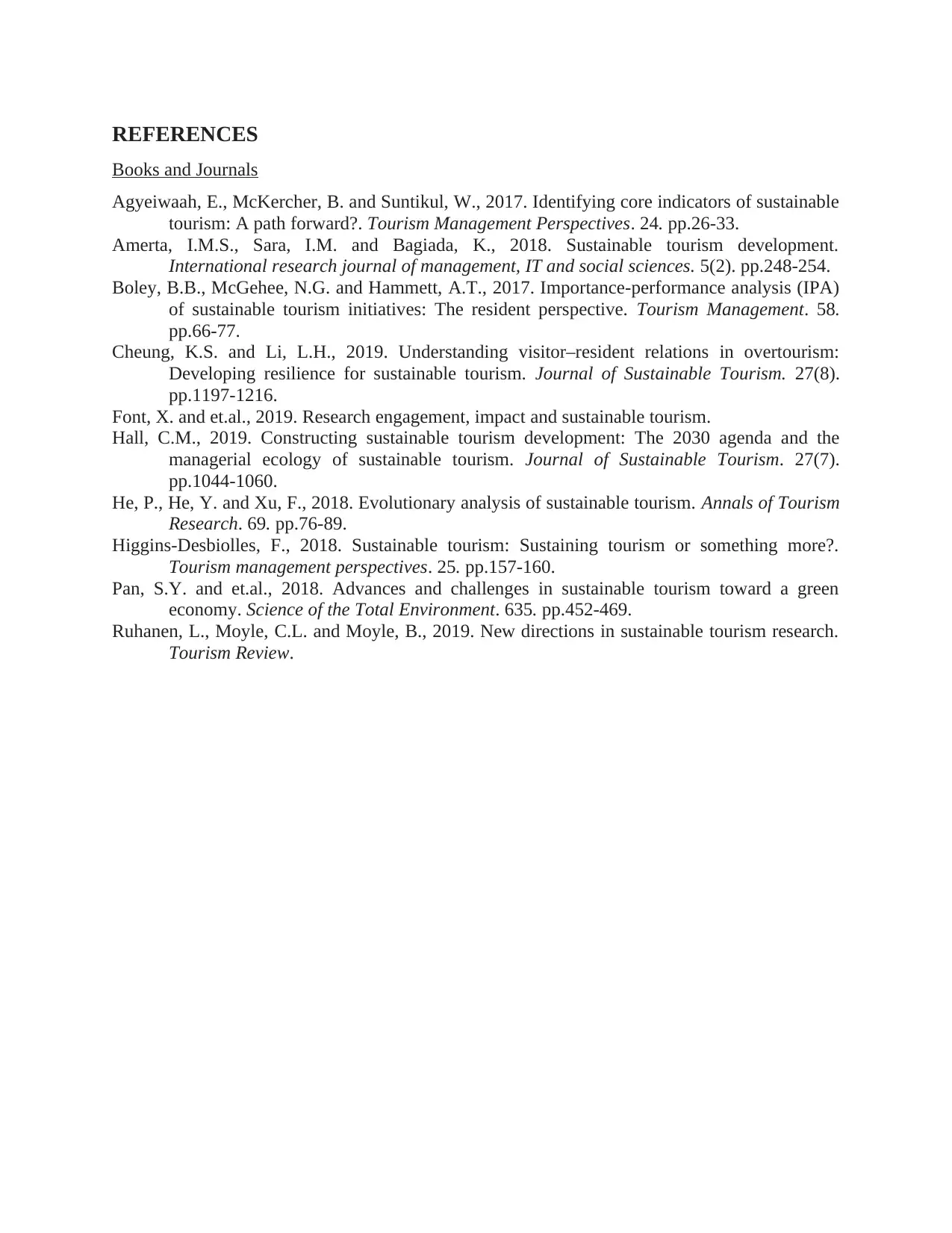
REFERENCES
Books and Journals
Agyeiwaah, E., McKercher, B. and Suntikul, W., 2017. Identifying core indicators of sustainable
tourism: A path forward?. Tourism Management Perspectives. 24. pp.26-33.
Amerta, I.M.S., Sara, I.M. and Bagiada, K., 2018. Sustainable tourism development.
International research journal of management, IT and social sciences. 5(2). pp.248-254.
Boley, B.B., McGehee, N.G. and Hammett, A.T., 2017. Importance-performance analysis (IPA)
of sustainable tourism initiatives: The resident perspective. Tourism Management. 58.
pp.66-77.
Cheung, K.S. and Li, L.H., 2019. Understanding visitor–resident relations in overtourism:
Developing resilience for sustainable tourism. Journal of Sustainable Tourism. 27(8).
pp.1197-1216.
Font, X. and et.al., 2019. Research engagement, impact and sustainable tourism.
Hall, C.M., 2019. Constructing sustainable tourism development: The 2030 agenda and the
managerial ecology of sustainable tourism. Journal of Sustainable Tourism. 27(7).
pp.1044-1060.
He, P., He, Y. and Xu, F., 2018. Evolutionary analysis of sustainable tourism. Annals of Tourism
Research. 69. pp.76-89.
Higgins-Desbiolles, F., 2018. Sustainable tourism: Sustaining tourism or something more?.
Tourism management perspectives. 25. pp.157-160.
Pan, S.Y. and et.al., 2018. Advances and challenges in sustainable tourism toward a green
economy. Science of the Total Environment. 635. pp.452-469.
Ruhanen, L., Moyle, C.L. and Moyle, B., 2019. New directions in sustainable tourism research.
Tourism Review.
Books and Journals
Agyeiwaah, E., McKercher, B. and Suntikul, W., 2017. Identifying core indicators of sustainable
tourism: A path forward?. Tourism Management Perspectives. 24. pp.26-33.
Amerta, I.M.S., Sara, I.M. and Bagiada, K., 2018. Sustainable tourism development.
International research journal of management, IT and social sciences. 5(2). pp.248-254.
Boley, B.B., McGehee, N.G. and Hammett, A.T., 2017. Importance-performance analysis (IPA)
of sustainable tourism initiatives: The resident perspective. Tourism Management. 58.
pp.66-77.
Cheung, K.S. and Li, L.H., 2019. Understanding visitor–resident relations in overtourism:
Developing resilience for sustainable tourism. Journal of Sustainable Tourism. 27(8).
pp.1197-1216.
Font, X. and et.al., 2019. Research engagement, impact and sustainable tourism.
Hall, C.M., 2019. Constructing sustainable tourism development: The 2030 agenda and the
managerial ecology of sustainable tourism. Journal of Sustainable Tourism. 27(7).
pp.1044-1060.
He, P., He, Y. and Xu, F., 2018. Evolutionary analysis of sustainable tourism. Annals of Tourism
Research. 69. pp.76-89.
Higgins-Desbiolles, F., 2018. Sustainable tourism: Sustaining tourism or something more?.
Tourism management perspectives. 25. pp.157-160.
Pan, S.Y. and et.al., 2018. Advances and challenges in sustainable tourism toward a green
economy. Science of the Total Environment. 635. pp.452-469.
Ruhanen, L., Moyle, C.L. and Moyle, B., 2019. New directions in sustainable tourism research.
Tourism Review.
⊘ This is a preview!⊘
Do you want full access?
Subscribe today to unlock all pages.

Trusted by 1+ million students worldwide
1 out of 9
Related Documents
Your All-in-One AI-Powered Toolkit for Academic Success.
+13062052269
info@desklib.com
Available 24*7 on WhatsApp / Email
![[object Object]](/_next/static/media/star-bottom.7253800d.svg)
Unlock your academic potential
Copyright © 2020–2026 A2Z Services. All Rights Reserved. Developed and managed by ZUCOL.



